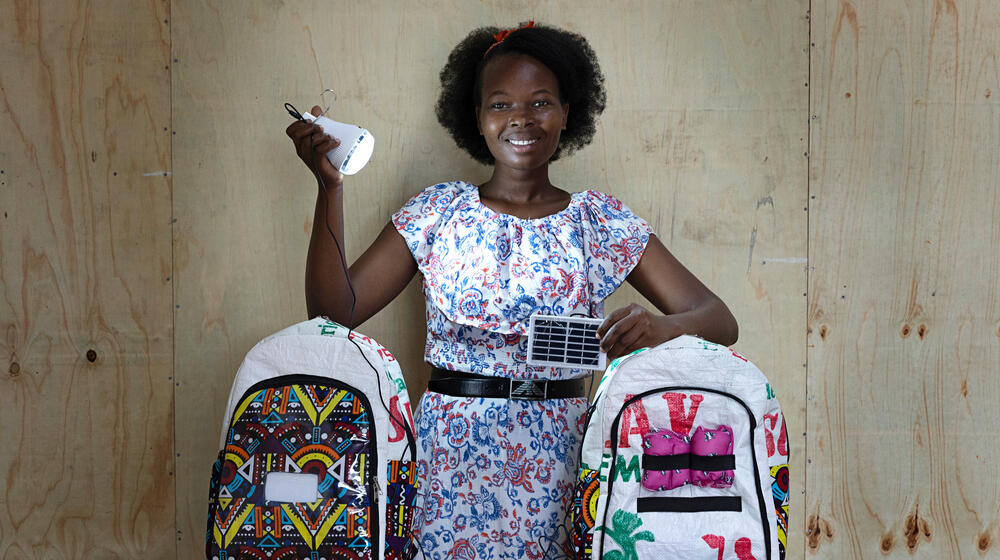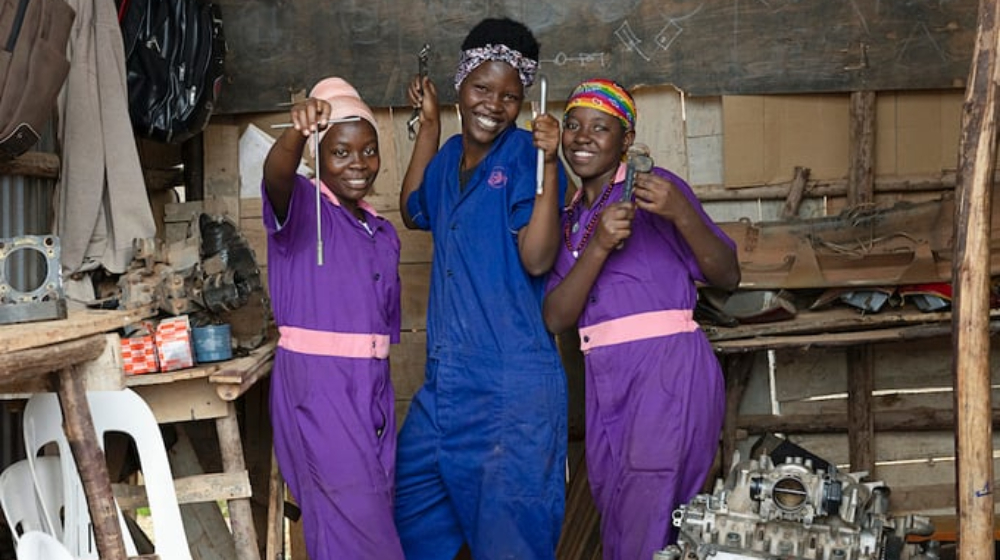News
Taking care of business: Empowering women and girls in Uganda to pursue their dream careers
- 08 August 2023
News
KAMPALA, Uganda – “In my village, people said women can't do the same jobs as men, but I want to prove it’s possible,” said 22-year-old Mary Lillian Amongin.
Ms. Amongin is an engineer involved with UNFPA, the United Nations sexual and reproductive health agency, through its partner the Smart Girl Foundation. For over a year now, Ms. Amongin has been helping to produce ‘smart bags’ – waterproof backpacks filled with useful items such as a sewing kit to make reusable sanitary pads, a solar-powered torch and information booklets on menstrual hygiene.
Ms. Amongin told UNFPA, “It has given me hope. I’m glad to support other girls like me to have dignity in menstruation and to be able to learn at night.”
She also put her engineering skills to innovative use by adding a solar panel to the front of the bags: The panel can be used to charge a torch and help girls to study at night if the electricity goes out. For those in displacement camps or other informal settings, the torches can also make them feel safer when using washroom facilities that are often unlit and unsafe.

Building skills to tear down barriers
To challenge gender inequality and the divisive narratives that continue to fuel it, UNFPA is supporting groundbreaking programmes in multiple countries, aimed at empowering women and girls to learn and lead.
“I want to become a great engineer who can help other girls like me to turn dreams into a reality and create positive change in people’s lives,” Ms. Amongin said. “In my village, people were saying that women can't do the same jobs as men, but I want to prove that it’s possible and a woman can perform a job better than any man.”
Despite near-equal numbers of men and women sharing the planet, the opportunities available to them are anything but. According to the World Bank, 178 countries have policies in place that block women from participating fully in the economy. Meanwhile, UN research shows that just one in three managers in the workforce are women – and gender parity won’t be reached in this area for more than a century.
Such policies and the norms that underpin them limit the potential of half the world’s people. They drive down the earning potential of women and girls over their lifetimes, restrict their access to leadership positions and perpetuate gendered economic inequality. Some 16 million more women and girls than men and boys live in extreme poverty.
Learning to lead
Tackling gender inequality is paramount to ensure lasting social and economic benefits for all of society: But awareness of women’s and girls’ value is essential to changing mindsets about what they can achieve and how they already contribute more than equally.
In 2019 the Smart Girls Foundation also launched a Girls With Tools programme to provide women and girls with training in traditionally male-dominated industries, such as mechanics and carpentry. The project encourages women and girls to embrace new interests and become leaders themselves.
When Ruth Natukunda became pregnant during the COVID-19 lockdown at just 14 years old, her family kicked her out of home. She found solidarity with the Smart Girls team and returned to the centre a few weeks after giving birth in January 2021, enrolling first as a seamstress but quickly developing a passion for mechanics.

Now 17 years old, she is a senior auto mechanics trainee. “I want to learn skills that help me support myself and my daughter,” said Ms. Natukunda.
Adolescent pregnancy rates in eastern and southern Africa are twice the global average at 94 births per 1,000 girls. Early pregnancy can cause serious injuries and is the leading cause of death among adolescent girls globally. It also often spells the end of girls’ education: In Uganda, this is borne out by a low literacy rate of just 37 per cent for women aged 15 to 24.
Not only do Ms. Nakutunda and her peers at the centre benefit from UNFPA’s work in innovation, they are active drivers of change, producing new tools and inspiring others to defend their right to be educated and join the workforce as equals to men and boys.
In 2019, UNFPA helped to fund the design and production of more than 5,000 of the bags that were distributed in central and eastern Uganda, and 1500 bags in 2020 that to both refugees and host communities in Kampala and the Kyaka II settlement for displaced people.